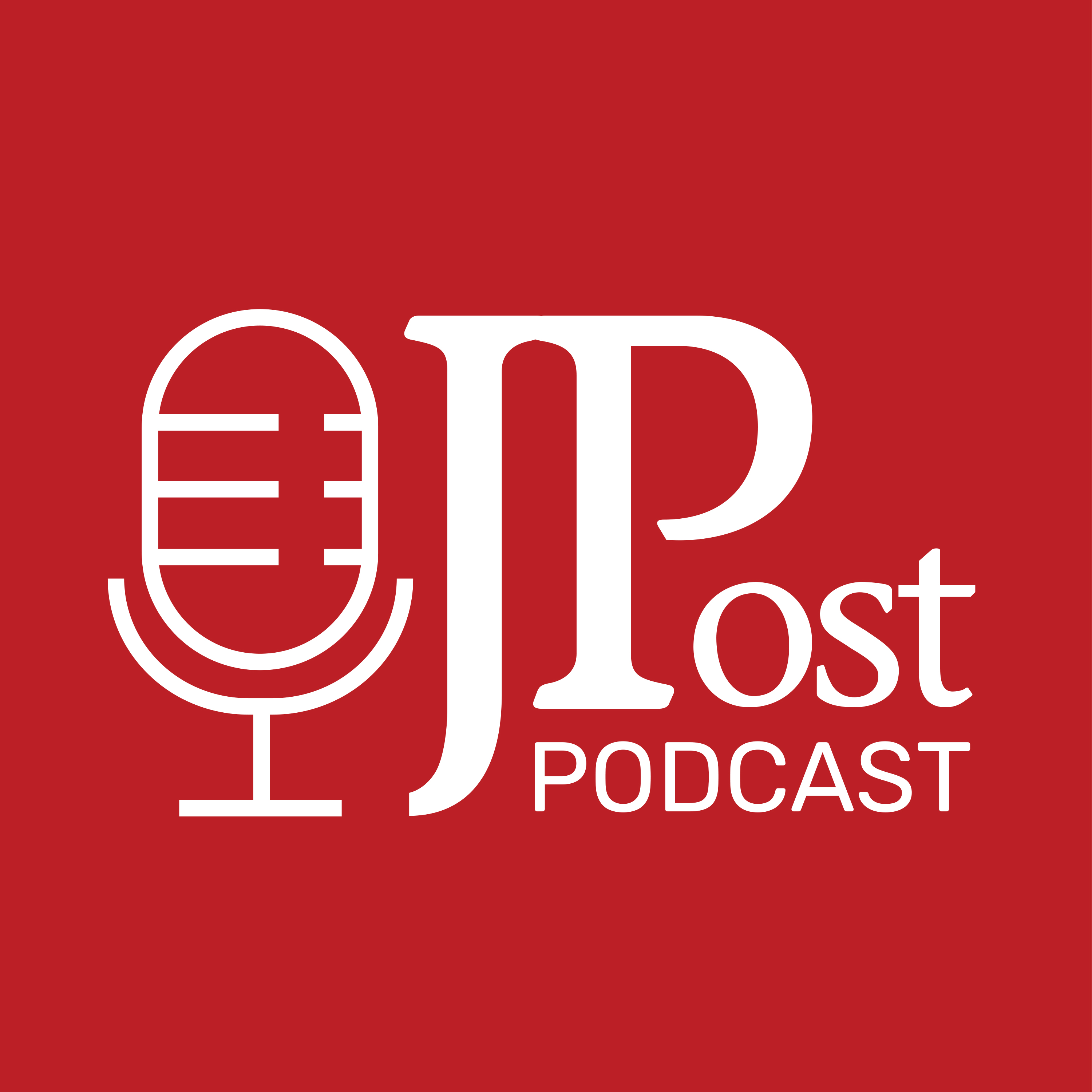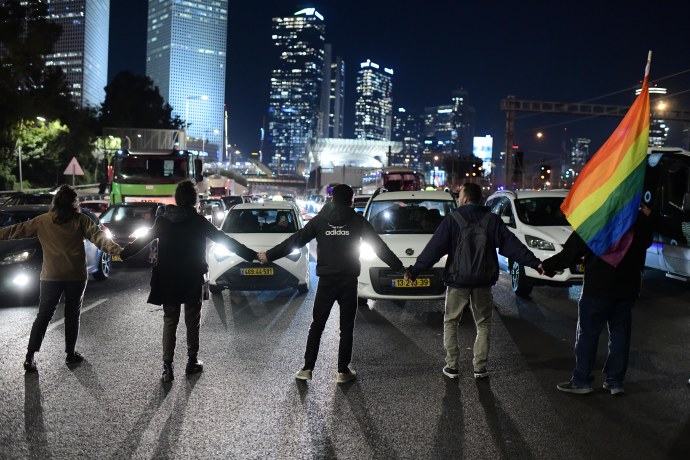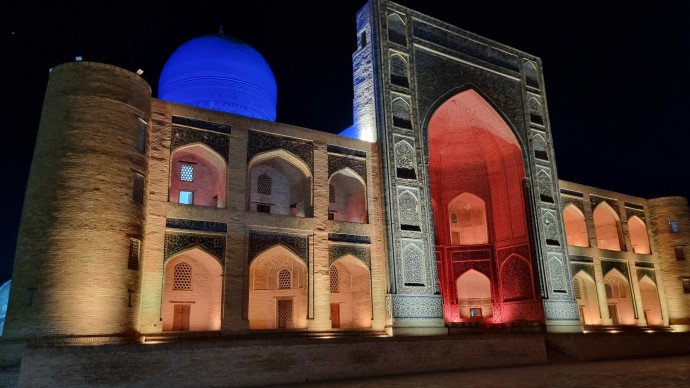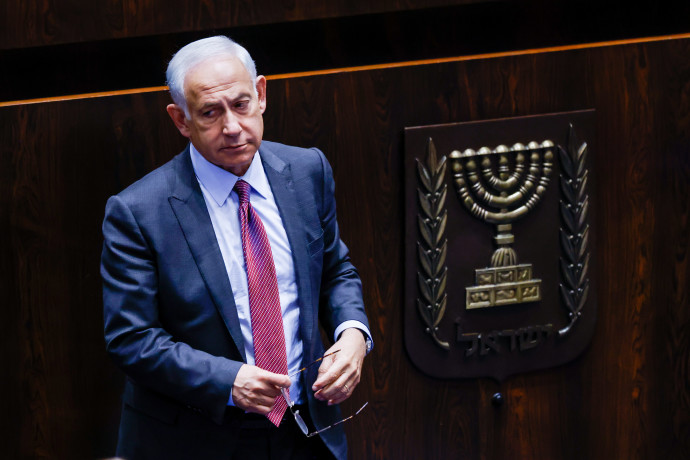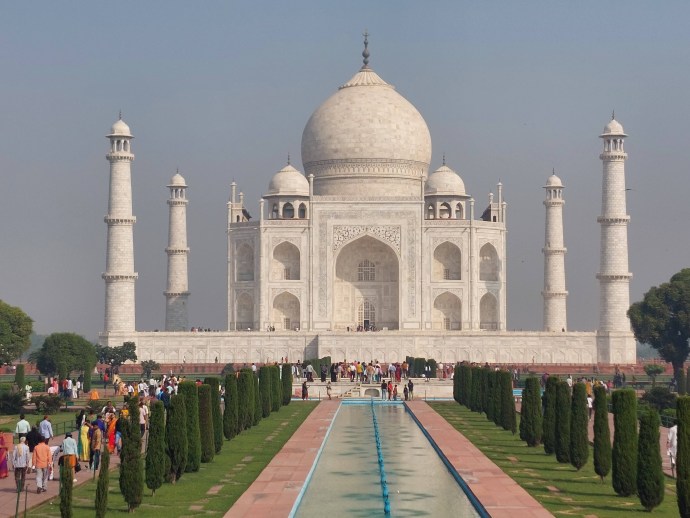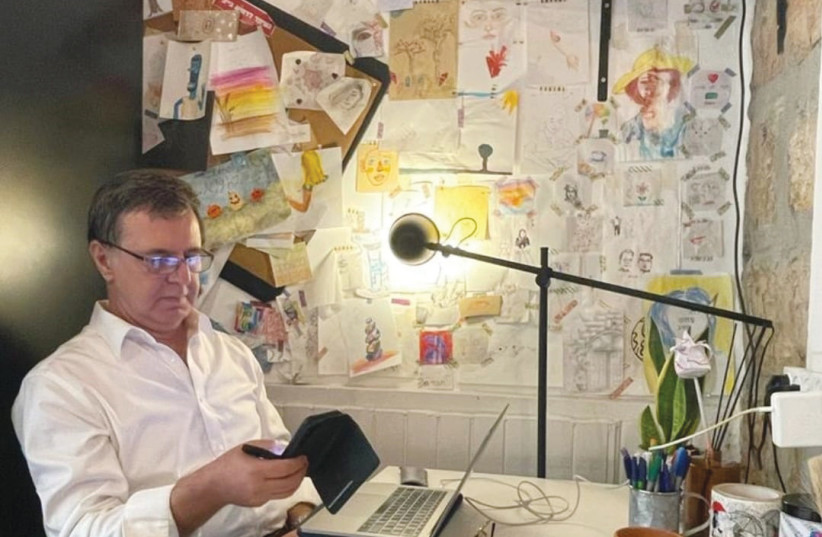Episodes
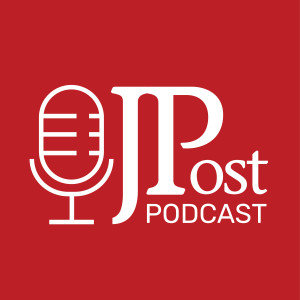
Thursday Jan 12, 2023
Reforms and revolutions: Is Israel heading towards civil war?
Thursday Jan 12, 2023
Thursday Jan 12, 2023
The Jerusalem Post Podcast with Yaakov Katz and Tamar Uriel-Beeri
This week, Yaakov and Tamar discuss the protests opposing judicial reforms in Tel Aviv, the so-called "civil disobedience" seen among the opposition, and as a bonus, they answer some questions about Ben-Gvir, the Temple Mount and linguistics. Then they are joined by Dr. Yosefa (Fogel) Wruble, a renowned Biblical and Jewish law lecturer, to discuss the modern implications of this week's Parasha, as well as the Book of Exodus as a whole.
Our podcast is available on Google Play, Apple Podcasts and Spotify.

Monday Jan 09, 2023
Bucharest Part 1 - Synagogues, Art & MasterChef Cuisine
Monday Jan 09, 2023
Monday Jan 09, 2023
The Jerusalem Post Podcast - Travel Edition, Episode 50
Remarkably, more Israelis visit Bucharest than people from any other county. As soon as you land, it's clear to see why it's such a popular destination: some of the top restaurants are run by an Israeli chef, the old Jewish area is rich with culture past and present and there's a burgeoning art scene to cap off a great visit.
This time:
- Where art thou, Mark?
- Is it a synagogue, opera house or both?
- The wonderful Zambaccian art collection
- Hear the most unusual, historic sounds of the Cajal Jewish Museum
- What on earth is urban anthropology?
- Food at last, with the top Masterchef judge
- Mark, please get off the phone, you have a plane to catch!
Mark and David were guests of Bucharest City Hall, the Embassy of Romania in Israel and Tarom.
Our podcast is available on Google Podcasts, Apple Podcasts and Spotify.

Thursday Jan 05, 2023
New Years resolutions and Temple Mount excursions
Thursday Jan 05, 2023
Thursday Jan 05, 2023
The Jerusalem Post Podcast with Yaakov Katz and Tamar Uriel-Beeri
This week, Tamar and Yaakov discuss the new year rolling around alongside a new Israeli government, National Security Minister Itamar Ben-Gvir's controversial visit to the Temple Mount, and the delicate state of the US-Israel relationship. Then, Yaakov sits down with Yishai Fleisher, spokesperson for the Jewish community in Hebron and senior advisor to Ben-Gvir, to discuss the right-wing politician's controversial entrance into the larger coalition and where he plans to go from here.
Our podcast is available on Google Play, Apple Podcasts and Spotify.

Friday Dec 30, 2022
LISTEN: Israelis’ looting, by land and sea alike
Friday Dec 30, 2022
Friday Dec 30, 2022
The Jerusalem Post Podcast with Yaakov Katz and Tamar Uriel-Beeri
Yaakov and Tamar discuss the looting scandal which hit Ashkelon's shores, the tension hovering over Israel in all walks of life, the new government, and the most read JPost articles of 2022. Then they speak with Hila Peer, chairwoman of the Aguda - Israel's LGBT Task Force about the community's outlook with the newly-formed government and its harsh comments against LGBTQ+ people.
Our podcast is available on Google Play, Apple Podcasts and Spotify.

Monday Dec 26, 2022
Uzbekistan - Silk Road, Flying Carpets & Synagogues
Monday Dec 26, 2022
Monday Dec 26, 2022
The Jerusalem Post Podcast - Travel Edition, Episode 49
Mark and David fulfill a lifetime ambition with a trip to Uzbekistan in Central Asia to meet the friendliest of nations including today's leaders of the country's ancient Jewish communities.
This time:
Parting is such sweet sorrow
Happy birthday Catherine
The Tashkent International Tourism Fair - the big launch
Music and dance, Uzbek style
A dip into magical Khiva
Gold embroidery, from Bukhara with love
Uzbek wine is pretty good
Reunited at last
1,250-year-old mikvah in a Jewish cemetery
The Bukhara Jewish leader has quite the voice
An ancient synagogue
The Zoroastrians were here
Sabina, the Hebrew-speaking flying-carpet saleswoman
The most beautiful square on earth?
Mark and David were guests of Uzbekistan.travel, Tashkent International Tourism Fair, Silk Road Samarkand, Uzbekistan Airways and Air Marakanda.
Our podcast is available on Google Podcasts, Apple Podcasts and Spotify.

Thursday Dec 22, 2022
Israel has a government! What now?
Thursday Dec 22, 2022
Thursday Dec 22, 2022
The Jerusalem Post Podcast with Yaakov Katz and Tamar Uriel-Beeri
Yaakov and Tamar talk about Israel's soon-to-be-formed government, lack of trust towards prime minister-to-be Benjamin Netanyahu, and government policies going into effect. One of those is the Law of Return, which at first seemed to be heading towards reforms, but at the moment seems to be shelved. Then, Yaakov and Jewish Affairs Correspondent Zvika Klein interview Sergio Della Pergolla, an Italian-Israeli demographer and statistician focusing on the Jewish population, and discuss the Law of Return and its implications.
Our podcast is available on Google Play, Apple Podcasts and Spotify.

Thursday Dec 15, 2022
The World Cup and Iran protests
Thursday Dec 15, 2022
Thursday Dec 15, 2022
The Jerusalem Post Podcast with Yaakov Katz and Lahav Harkov.
Yaakov and Lahav talk about the World Cup in Qatar, the Moroccan team that has made history, why it's taking so long for Netanyahu to make a government and then speak to Roya Hakakian, an award-winning Iranian-American writer and activist on the ongoing protests in Iran and why this time they might succeed.
Our podcast is available on Google Play, Apple Podcasts and Spotify.

Monday Dec 12, 2022
Kosher yachting and India’s Golden Triangle
Monday Dec 12, 2022
Monday Dec 12, 2022
The Jerusalem Post Podcast - Travel Edition, Episode 48
We join skipper Warren Marland as he embarks on a new enterprise - kosher yachting in the Mediterranean .Then Mark regales us with tales from his recent journey through India.
Join the boys for a half hour of travel adventure and their own particular brand of humor.
Our podcast is available on Google Podcasts, Apple Podcasts and Spotify.

Thursday Dec 08, 2022
Extremism, everywhere: The UN, Israel and Kanye
Thursday Dec 08, 2022
Thursday Dec 08, 2022
The Jerusalem Post Podcast with Yaakov Katz and Lahav Harkov.
This week's guest, Hillel Neuer of UN Watch, gets into the United Nations' hypocrisy on Israel, Iran and more, and what Israel and the US can do about it. Plus, Yaakov and Lahav discuss the latest in coalition talks, especially the controversy surrounding anti-LGBT, anti-feminist MK Avi Maoz, and whether to laugh or cry about the artist formerly known as Kanye West.
Our podcast is available on Google Play, Apple Podcasts and Spotify.

Thursday Dec 01, 2022
JPost: Where we were & where we’re going
Thursday Dec 01, 2022
Thursday Dec 01, 2022
Editor-in-Chief Yaakov Katz sat down with Lahav Harkov, Khaled Abu Toameh and Seth Frantzman for a conversation about the Post, its significance and how their jobs have changed.
To mark The Jerusalem Post’s 90th anniversary, Editor-in-Chief Yaakov Katz sat down with Diplomatic Correspondent Lahav Harkov, Palestinian Affairs Correspondent Khaled Abu Toameh and Middle East Affairs Analyst Seth Frantzman for a conversation about the Post, its significance and how their jobs have changed since they became reporters. The full conversation can be heard on The Jerusalem Post Podcast. This is an abbreviated version, edited for style.
JPost at 90
Yaakov: Lahav, when you look at 90 years of The Jerusalem Post and where we are and how we’ve gotten here, what comes to mind?
Lahav: So, first of all, if we look more broadly at the 90 years of The Jerusalem Post, we used to have this column that was from the archives. I don’t remember if it was every day or every week. If something happened, you’d see how The Jerusalem Post was covering these huge events in Israel’s history and in the world’s history. And it really gives an idea of how significant this newspaper has been in telling Israel’s story to the world.
In the past 10 or 12 years, I would say that the thing that has changed the most is how fast everything has become – because of the media environment, more broadly, everything’s moving really fast. Everything is on social media. You have to have some information the second something happens. And that’s challenging in terms of trying to keep up our accuracy and to try to use the sources that we have that other people reporting in English don’t have. But I think that we’ve kept to that challenge. We’ve met that challenge impressively.
Yaakov: But I think it’s also extra sensitive in the diplomatic beat, right? Because of this, the information that you publish really could impact Israel’s standing or its ties with a country, or how it’s going to be condemned at the UN or not.
Lahav: Yes, there are some stories that you can do and they’re quick and easy; you know, if a leader has a phone call with another leader. But a lot of the important things on the diplomatic beat are happening behind the scenes, and they take a lot of phone calls and a lot of talking to a lot of different people to try to corroborate things. And they’re definitely not instant stories.
I used to be on the Knesset beat, and you would have near uniformity of coverage because everything was at the Knesset. You sit in the committee rooms and you might have a different headline, but more or less the same things are happening. But on the diplomatic beat it’s very individual because you’re really getting stories behind the scenes.
Yaakov: Right. It’s not just what’s happening. Seth, you’ve traveled the region on behalf of The Jerusalem Post. You look at this 90-year milestone. What’s your big takeaway?
Seth: I think that one of the fascinating things is if you go back and look at The Jerusalem Post in the 1930s and in the area of the pre-state period especially, it’s fascinating to the degree to which the Post had reporters that were actually in the region who were going to places like Lebanon or Egypt, and they were getting stories from people there. And they were actually doing a lot of reporting also on the Arab community and what was then British Mandate.
So obviously that shifted in the 1950s or ’60s, and then you get to the present day. I think that when you look back at those 90 years, what I found in traveling the region, the fascinating thing is that even countries with which Israel doesn’t have any relations, like Iraq, the times that I would travel there and spend time with the Kurds, for instance, a lot of people there are reading The Jerusalem Post.
I think in the West, as Lahav said, there is a huge number of media. Everyone’s running to get tweets out and stories, and a lot of it kind of looks the same sometimes; but when you’re in the region, you see that The Jerusalem Post is regarded as this legacy historic publication that people can rely on and that really matters.
I mean, Iranian media is reading The Jerusalem Post every day. And they’re re-reporting what we write sometimes in their own weird interpretation of it. Like if we write that Iranian drones are a threat, Iranian media will re-report that and say, ‘Well, you see Israel is afraid of our drones.’
Yaakov: The Zionist newspaper, The Jerusalem Post says...
Seth: Yes, the Zionist entity or whatever. But they’re definitely reading it. And I think it shows the degree to which, even when sometimes we feel in the West that we are one of a huge number of publications, it’s hard sometimes to sort yourself out from other Jewish publications and other legacy media. I think one thing that’s interesting in the region is the degree to which The Jerusalem Post is definitely one of the go-to places that regimes and people are looking at in terms of, well, what’s the normal average thing that’s happening in Israel? Here’s where we’ll go to find out.
Yaakov: On that note, Khaled, how are you received on your beat, which is in the Palestinian territories, working with the Palestinian Authority? They know you’re coming from The Jerusalem Post. We don’t hide our DNA as a pro-Israel newspaper, obviously as a Zionist newspaper. How do they receive you?
Khaled: I’ve been with the Post for nearly 20 years now. I would say that in recent years, or probably in the past 10 or 12 years, the Palestinian attitude toward the Israeli media has changed. It has become much more hostile and less tolerant, and there’s actually a boycott of the Israeli media. It’s by the Palestinian Journalism Syndicate. It’s by my Palestinian colleagues, and it’s by the Palestinian Authority. And that makes my job much more difficult to get information from Palestinian officials.
As Seth mentioned, The Jerusalem Post was always a source of information about Israel for people around the world. It was also a source of information for the Palestinians for many years. And I believe it still is because the Palestinians do not have a free media, and they rely heavily on the Israeli media. I see a lot of our articles from the Post and news stories translated almost every day in the Palestinian media.
Yaakov: They give us credit?
Khaled: Yes. They mention The Jerusalem Post. Some say it’s the Zionist paper. Some say it’s an Israeli right-wing paper. Some people call it Hebrew media. They have all these labels. But how am I personally perceived? Look, I’ve been there for many years. You know, I don’t only work for The Jerusalem Post; I’m also a man of the international media. So that helps me a bit. And I can go there and say, ‘Today I’m not for the JPost, I’m for someone else.’ So they would be open. But it is very difficult in our culture, the Arab culture. A journalist is not supposed to hang the dirty laundry out. A journalist is supposed to be loyal to his president, his prime minister, his government, his people, his homeland. And the truth is like, you know, somewhere down there.
Khaled: But I still go back to Ramallah almost every day. I’d be much more afraid to show my face in Ramallah if someone stopped me and said, ‘We caught you lying or fabricating.’ First of all, most of the criticism I get comes from the Palestinian government, the Palestinian Authority, and it’s along the lines of ‘What you reported is true. It’s accurate, but please shut up.’ And that kind of criticism does not scare me. Is it dangerous? Yes. Some of my colleagues over there have been arrested. Others have been forced out of their jobs. Others have been intimidated. But fortunately for me, I go there and I come back to Jerusalem at the end of the day. I don’t sleep there.
Yaakov: I’ve yet to get a call from Abu Mazen complaining about you, but maybe one day. You never know, right?
Khaled: He has complained about me, and he even invited me saying, ‘You know what? Do you want to come? If you want an interview, I’ll give you an interview.’ The thing is that criticism is perceived as some kind of an opposition. There’s no tolerance for criticism over there. And they assume that if you criticize them, then you must be on the payroll of the Jewish lobby, or you must be a Zionist agent, or you must be after them for one reason or another. And that hasn’t changed, unfortunately, this perception that a journalist has to be loyal to his people and his government.
Yaakov: I want to get from each of you a story that highlights your career of being with The Jerusalem Post. So Lahav, let’s start with you.
Lahav: The last two and almost three years now, I’ve been on the diplomatic beat. And it’s very exciting for me to be able to travel with the prime ministers. I’ve been to the White House a bunch of times. I’ve taken that picture in the White House press room, standing there, like CJ from the West Wing, that all the diplomatic reporters take. But there’s one story that stands out that actually was when I was still a Knesset reporter, but it wasn’t my usual thing.
I accompanied Shimon Peres on his last trip as president, and it was to Oslo. He had a royal dinner, like a state dinner, but it was in the palace with the king and queen, and all the journalists were invited. In typical Israeli fashion, most of them did not understand what black tie meant, but we all got as dressed up as we could. And it was just something that I think, unless you’re like a royal correspondent in London, it was a once-in-a-career experience to be eating in the royal palace with the king and queen.
I sparked a minor diplomatic incident at that dinner because I was seated next to Rabbi Michael Melchior because we were the only people eating kosher food, and I wrote about it in the article because I thought they served it to us really nicely. They served it to us on china dishes, and they tried to make it look as similar to everyone else’s food. And then they also gave us wine, and the wine was from the Golan Heights Winery. I didn’t even think about it that I mentioned it in the story, but the government got really criticized for it. And they had to release a statement clarifying that they weren’t endorsing.
Yaakov: From ‘occupied’ land?
Lahav: Yes. Exactly.
Yaakov: Wow. So, Seth, give us a story from your travels around the world with The Jerusalem Post.
Seth: I think one of the most memorable ones was in 2015, when there was this huge refugee crisis in Eastern Europe because Angela Merkel had invited a lot of immigrants to come to Germany. Something like a million people were pouring over the borders on boats, mostly from Turkey to Greece, and then they were going from Greece. They had to walk across the borders into what was Macedonia and then Serbia, and then to Hungary.
And the countries were trying to close the borders to these people. Hungary was building a fence, so it was kind of imperative to get there. And I was trying to figure out how do you cover a story where you have a million people on the move across 600 or 800 miles of landscape? I decided, well, okay, I can just rent a car, right? I mean, you can just rent cars? Well, no. I went online and found you can rent a car in Greece, but you’re not really supposed to drive through all these borders. And if you want to, you have to get all this insurance, which cost a lot of money – but the story was worth it.
I flew to Greece, I hired a car, and I ended up sleeping in the car while traveling across the borders with the immigrants. It was a pretty epic story. I ended up on the Hungarian border, when they completed the fence and the day these people were then stopped. And so, it was a huge privilege to do it. It took place over a few days, and it was great to be a reporter, not just for The Jerusalem Post but in general, to be able to cover this story which was a world event.
Khaled: Well, unlike Lahav, I’m not invited to join Abu Mazen on any of his visits to royal palaces, not to Washington and not to London or anywhere else because it’s the Israeli media, not the Palestinian media. But I can tell you that The Jerusalem Post has really changed my life. Before I was writing for the Post, I did not receive invitations to speak to different people in different places. But thanks to the Post and because of my writings over the past 20 years, I’ve been meeting diplomats, I’ve been meeting congressmen, senators, decision makers, from all around the world. I’m invited to different places around the world to speak.
And I think that has really been a big step for me. And that shows the power of The Jerusalem Post as being one of the major sources of information on Israel for English-speaking people around the world. Now, of course, I’ve covered a number of important stories for the Post. One of them was the funeral of Yasser Arafat in Ramallah. As a Jerusalem Post reporter, I remember that many of the foreign journalists who were with me had to rely on my reporting because I was sitting in the Muqata (PA headquarters) back then, reporting on the atmosphere and the responses from the Palestinians.
Another big scoop that I had with The Jerusalem Post was an exclusive interview with the mastermind of the “Karin A weapons ship,” who’s still in prison. He phoned me from Israeli prison to give me his version and publish in The Jerusalem Post about what had happened. And he was very upset with the Palestinian Authority. He said that they abandoned him and that he was a soldier carrying out orders. I think it showed how many people rely on The Jerusalem Post to get information. And these are stories that I’m proud of because we’ve been able to prove our credibility. I still get calls from many Palestinians who, because they don’t have a free media over there, come to us hoping that we will publish their stories.
Yaakov: I find it always amazing, the doors that The Jerusalem Post does open around the world and the leaders of countries who want to talk to us. I recently had an interview with the Taiwanese foreign minister, and we put that online. Within minutes, the Chinese ambassador demanded that we remove the story, and they filed an official complaint with the Foreign Ministry. It became international news. This one thing that we did, which was talk to a foreign minister of a country. And we become sometimes even part of the story.
I wonder, Lahav, if we look to the future of media and journalism, what are the big challenges you see as a beat reporter covering the diplomatic beat in the larger scheme of things, when it comes to the industry?
Lahav: I do think that the speed is a challenge to accuracy and also to reporting in a way that’s not monolithic. I think that an advantage that we have at The Jerusalem Post over other people reporting in English from Israel is that we are Israeli. We live here, we have our families here. We understand what’s going on in life here in Israel in a way that someone who’s here for two, three years maybe doesn’t. And the way to bring that forward in our deeper and more insider understanding of what’s happening in Israel is again not as easy, when everything is these quick snippets that need to get onto social media right away. So I think that’s one of the challenges. I don’t know how much we want to talk about the business model of media, but the business model of media has rapidly changed.
Yaakov: Multiple times it has become much more complicated. Seth, what are you thinking about the whole way the media industry has changed, and how do we stay relevant as we move forward?
Seth: It is difficult because I think that one thing is social media giants – Facebook and Twitter – where most people are getting their information now. We see all the chaos now on Twitter, but at the end of the day, maybe 80% or 90% of people are going through some platform that is controlled by one or two companies. And so a slight shift in an algorithm can mean that, whereas one day our stories that we were posting on Facebook are being shared thousands of times, and then it can be 30 times or so. It really matters to us, and it matters to us putting out information.
I was at the recent Jerusalem terrorist attack scene, and I did some short video, and it got thousands of views very quickly. So I think trying to be able to not only get the relevant stories out there and make sure that we have the sources on the ground, but we also have to make sure that we are in touch with and understand what’s going on with these big platforms and how people are getting information. And it’s not just a question of always having the story first, but it’s making sure that we put it out in the right way.
Yaakov: I’m wondering, Khaled, how relevant is the media still, and the role that we play as journalists when it comes to the Israeli-Palestinian conflict, which seems so stuck and not moving forward. Do the stories really make a difference? Because you and I joke occasionally how it’s the same stories that we wrote 20 years ago, and now they’re happening again 20 years later.
Khaled: Sometimes I feel I’m recycling the same story. I’ve been writing similar stories for the past 35 or 40 years in different places – but you know, this is the topic that we’re covering, and everyone is still interested. Many people are really interested in this conflict, and they are hungry for information. And any information you provide them, they will take it. I think that the biggest challenge we are facing in recent years is social media because we have to compete with social media, and that’s very difficult. But I think what we do as a newspaper, as mainstream media, is bring stories that are not there already. We have to keep the news relevant and offer the readers a different perspective that they don’t have or rarely see on social media. We need to find ways to adapt ourselves to the reality that we are living in right now.

